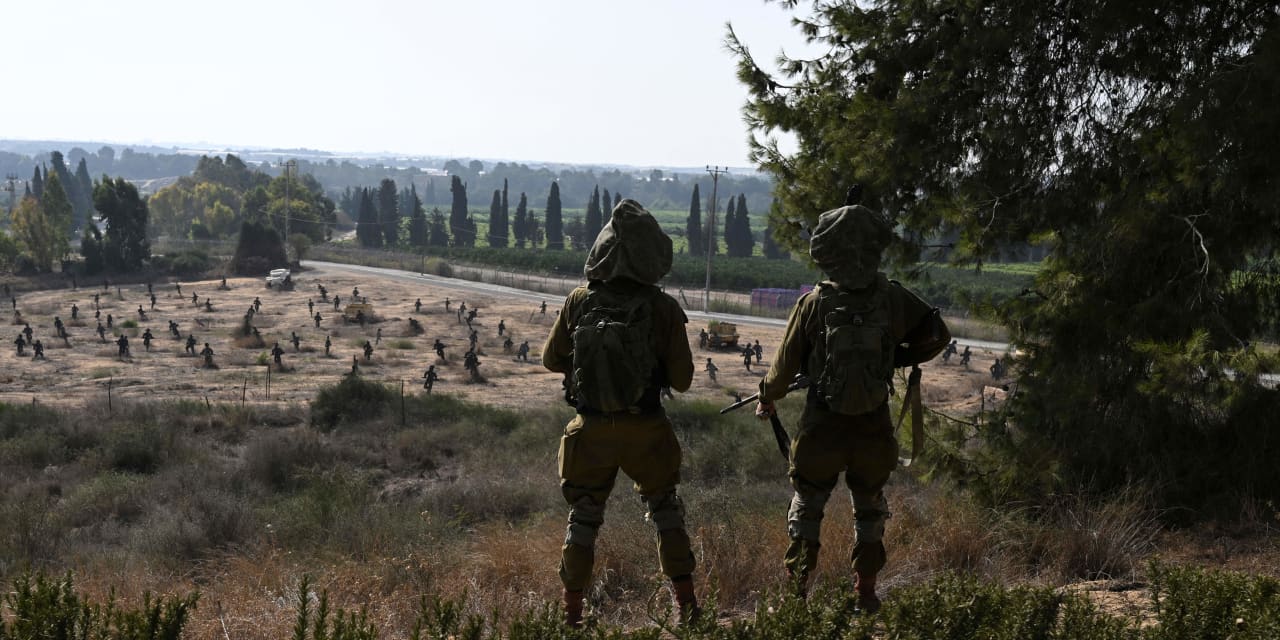Two Israeli soldiers stand in Kibbutz Yad Mordechai, over looking a sculpture park in the grounds of the Yad Mordechai Museum, close to Israel’s northern border with the Gaza Strip on Oct. 24, 2023, amid the ongoing battles between Israel and the Palestinian group Hamas.
Yuri Cortez/AFP/Getty Images
About the author: Lina Khatib is the director of the SOAS Middle East Institute at SOAS University of London and an associate fellow at the Middle East and North Africa Program at Chatham House.
The ongoing war between Hamas and Israel is amplifying geopolitical considerations in the Middle East and beyond. While neighboring countries have framed their reactions to the conflict in terms of the need to resolve the Israel-Palestine conflict, the reactions are primarily driven by varied national interests and concerns. There is no uniform Arab geopolitical landscape, but put together, governments’ reactions point to a shared goal of de-escalation.
Qatar has found in the war an opportunity to reinvigorate its status as mediator. Qatar hosts some of the leadership of Hamas and enjoys good relations with Iran, which backs Hamas. Qatar is acting as intermediary in hostage negotiations between Hamas and Israel, which has so far led to the release of four hostages. Qatar is framing this achievement—and associated praise from the U.S.—as proof that it is correct in its strategy of keeping communication lines open with multiple opposing actors. Its role in the current conflict is giving its geopolitical ambitions a boost.
This boost for Qatar along with the failures in Israeli security and intelligence that the Oct. 7 Hamas attack exposed present a challenge to the United Arab Emirates, which signed the U.S.-brokered Abraham Accords with Israel as a way to bolster the UAE’s geopolitical standing and security. The UAE won’t pull out of the Abraham Accords but will need to find ways to assert its regional standing.
The months before the war started were dominated by the intensification of talks between Saudi Arabia, Israel, and the U.S. to pave the way for Saudi-Israeli normalization. The war has stalled but not derailed the talks. They are likely to resume, with Saudi Arabia insisting on the two-state solution it originally proposed as part of the 2002 Arab Peace Initiative. But a two-state solution will become a precondition for normalizing Saudi relations with Israel, rather than a plan to work toward in the future. Saudi Arabia’s main concern remains regional stability, and it is using all its available tools to that end. Regional instability would prevent Saudi Arabia from achieving its ambitious economic goals and would also be detrimental to Saudi Arabia’s political leadership in the Middle East. This is why Crown Prince Mohammed bin Salman accepted having a call with the Iranian president a few days after the Hamas-Israel war broke out and why Saudi Arabia has intensified talks with Russia and China to call for a humanitarian ceasefire.
For Egypt, the war presents a significant security and political headache. Egypt shares a border with Gaza. President Abdel Fattah al-Sisi has a presidential election in December and is concerned about any flow of Palestinians from Gaza into Egypt becoming a scenario of displacement rather than evacuation. Egypt has been carefully balancing international cooperation on humanitarian aid with assertiveness regarding the use of the Rafah crossing with Gaza. Egypt is also concerned that Hamas militants may enter and destabilize Egypt along with any flow of Palestinian refugees. Jordan shares similar concerns about displacement of Palestinians and has joined Egypt in declaring the issue of added Palestinian refugees from Gaza as a red line.
Lebanon has already gotten a taste of the war: Iran-backed Hezbollah has launched rockets on Israel in support of Hamas, leading Israel to retaliate by bombing areas in southern Lebanon. Although Iran and Hezbollah have escalated their rhetoric against Israel, threatening a new battlefront, it is unlikely that Lebanon will be dragged into a full-on war with Israel. This is due to domestic considerations—Lebanon’s severe financial crisis means the country cannot bear the cost of war, and there is no popular support for an escalation by Hezbollah. It is also due to the larger geopolitical context.
The U.S. has deployed two aircraft carrier groups to the Eastern Mediterranean as a deterrent to Hezbollah and is working on de-escalating the conflict. It is not in the interests of the U.S. to be dragged into war in the Middle East, particularly while the Ukraine conflict is ongoing and a U.S. election is looming. Such a scenario would benefit Russia but would be detrimental for Iran, because it would expand the conflict into Iran. Iran pursues its objective of geopolitical influence in the Middle East through supporting armed groups that engage in proxy wars away from Iran itself.
An Israeli ground invasion would test regional attitudes and shatter the loosely shared goal of de-escalation. But with U.S. interests also at stake, Israel and the U.S. will be thinking carefully about Israel’s next steps in the war.
Guest commentaries like this one are written by authors outside the Barron’s and MarketWatch newsroom. They reflect the perspective and opinions of the authors. Submit commentary proposals and other feedback to [email protected].
Read the full article here










